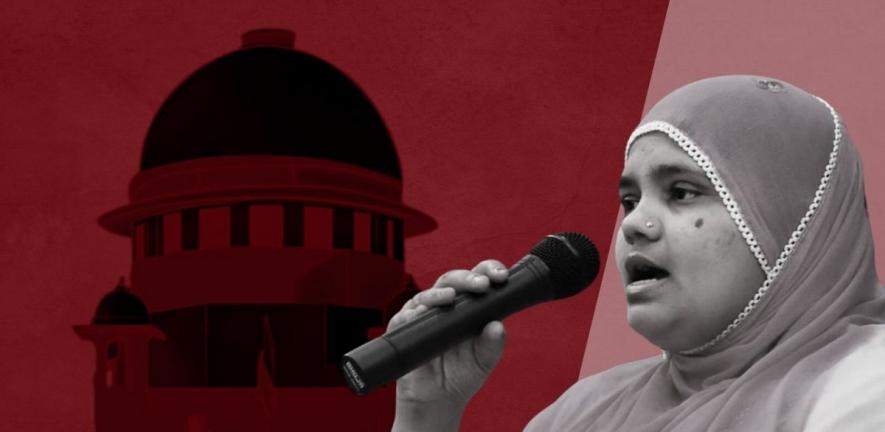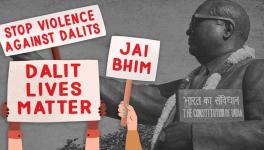Bilkis Bano Case: Why SC Dismissed Plea of 10 Convicts Seeking for More Time to Surrender

The Supreme Court dismissed the plea filed by 10 of the 11 convicts in the Bilkis Bano case, for an extension of time to surrender after the Supreme Court dismissed, earlier this month, the remission granted to them by the Gujarat government in 2022.
—
Today, the Supreme Court dismissed the plea of 10 of the eleven men convicted in the Bilkis Bano case seeking more time to surrender.
The men have been convicted for gang-raping a pregnant Bilkis Bano and killing 17 of her family members, including her three-year-old daughter, during the 2002 Gujarat pogrom.
Having spent 14 years in jail, their sentences were remitted citing ‘good behaviour’. They were subsequently released on August 15, 2022, as part of Azadi ka Amrit Mahotsav, which translates to ‘Grand Celebration of Freedom’s Elixir’.
The remission was challenged before the Supreme Court and on January 8, 2024, a division Bench of Justices Nagarathna and Bhuyan quashed the remission Orders. The court ordered the convicts to surrender within two weeks, which ends on January 21, 2024.
On January 17 and 18, 10 of the eleven convicts applied for an extension in the time to surrender, citing various reasons ranging from “ailing parents”, “heart conditions” and “standing crops”.
Today, a division Bench of Justices B.V. Nagarathna and Ujjal Bhuyan stated that the reasons mentioned in the applications seeking an extension of time lack merit.
What excuses have the convicts pleaded for an extension of time for surrender?
Govindbhai Nai
Govindbhai Nai, 54 years old, had stated that he needs to make arrangements for his “ailing” parents including his father who is “bedridden” and two sons who are “completely financially dependent” on him.
He claimed that he is an “old man” who is suffering from “asthma” is in “really poor health” and is in need of a “haemorrhoid operation”. He had asked for four weeks of additional time to surrender.
Ramesh Rupabhai Chandana
Ramesh Rupabhai Chandana, 58 years old, had stated that he needs to make “viable arrangements” for his mother, who is suffering from “age-related ailments”.
He claimed to have undergone “angiography” and to be on medication for a “heart ailment” and had stated that the condition to surrender within the time directed by the court will adversely affect “not only his mental health but will also affect him physically severely”.
Further, he had argued that he “actively” looks at his crops and is the only male member of the family “who could look after these agricultural activities”.
Chandana had also claimed that his young son is of “marriageable age” and he bears the responsibility to “look after this affair” and that during the period of release, he has committed “no infraction of law”.
He had asked for six weeks of additional time.
Mitesh Chinmanlal Bhatt
Mitesh Chinmanlal Bhatt, 62 years old, claimed that he is a “senior citizen” and had “undergone eye surgery for cataract”. He had stated that he is “unmarried” and “earning his livelihood from agricultural produce” and needs five to six weeks for “harvesting and other processes” in connection to the winter crop.
He had asked for six weeks of additional time.
Jaswantbhai Chaturbhai Nai
Jaswantbhai Chaturbhai Nai, 66 years old, had stated that he is a “senior citizen” and his “entire family is dependent” upon the income generated through agricultural produce. He claimed that he needs five to six weeks to complete the “harvesting and other processes” of the winter crop.
He has asked for six weeks of additional time to surrender.
Radheshyam Bhagwandas Shah
Radheshyam Bhagwandas Shah, 52 years of age, had asked for six weeks and claimed that he needed to make “financial arrangements” for his aged parents, wife and college-going son.
Rajubhai Babulal Soni
Rajubhai Babulal Soni, aged 59, asked for a six-week extension stating that he needs to make “financial arrangements” for his old mother, ailing wife and two sons.
Bipinchand Kaniyalal Joshi
Bipinchand Kaniyalal Joshi, aged 59, claimed that has undergone “leg surgery resulting in a partial handicap” and that to surrender in this condition will be “adverse not only to his mental health but will affect him physically”.
He has stated that he needs to make arrangements because his wife is battling cancer and “requires husband’s support” and that his brother is a senior citizen and is in “need of the assistance of the applicant”.
Bipinchand had asked for a six-week extension.
Pradip Ramanlal Modhiya
Pradip Ramanlal Modhiya, aged 56, claimed to have undergone “surgery for lungs and requiring regular consultation with doctors”. He stated that his wife died due to kidney failure and “some department procedure pertaining to her service benefits is due”. He had asked for four weeks.
Kesharbhai Khimabhai Vohania
Kesharbhai Khimabhai Vohania, aged 58, had claimed that he is “an old man and a senior citizen and has senior medical conditions”. He had asked for six weeks.
Shaileshbhai Chimanlal Bhatt
Shaileshbhai Chimanlal Bhatt, aged 64, claimed that he is “an old man and a senior citizen” and that “his wife lives alone in the village” and that he has “one unmarried son” whose “marriage is due” and that the “harvesting of winter crop is due”.
He had asked for six weeks.
Bakabhai Khimabhai Vohania
Bakabhai had not filed an application for an extension.
The severity of the crime
During the 2002 Gujarat pogrom, Bano was at her father’s home in Randhikpur in Dohad district when the village came under attack from a right-wing Hindu mob.
Bano, who was pregnant with a second child, fled with 17 persons, including her three and a half years old daughter, and her cousins, one of whom was also pregnant.
They travelled from village to village in place of safety. They had to stop at one place, where the pregnant cousin gave birth. But then they continued to move on because the area was not safe.
When they stopped near Pannivel, two vehicles with about twenty-five to thirty people, carrying swords, lathis and sickles in their hands, started shouting “musalmanoko maro” (kill the Muslims) and attacked them.
Bano identified 12 accused persons, all of whom were from her village Randhikpur. One of the convicts, Shailesh pulled Bano’s daughter from her arms and ruthlessly smashed her on the ground.
Jaswantbhai attacked Bano with a sword. Then, he along with Govindbhai and others forcibly removed Bano’s clothes and raped her. Meanwhile, other accused persons tore the clothes of the other females in the group and committed rape on them and assaulted the male members of the group.
Bano became unconscious. When she regained consciousness, she found herself naked and saw her relatives lying dead, including her cousin’s newborn baby.
Bano registered a first information report (FIR) against the 12 accused persons. However, the FIR was not correctly recorded as it was not mentioned that she was raped. The FIR was registered against unknown persons even though Bano had recognised them all.
A case was registered in 2003 at a local police station. On March 25, 2003, the police filed a report citing inconsistencies in the testimonies and a lack of evidence. Eventually, the report was accepted by a magistrate and the case was closed.
Bano was shifted to a refugee camp where she met members of the National Human Rights Commission (NHRC). At that time, the NHRC was led by former Chief Justice of India J.S. Verma and also comprised former Supreme Court judge Sujata Manohar. The NHRC intervened and ensured legal assistance to Bano. The NHRC approached the Supreme Court through senior advocate Harish Salve.
Salve urged the court for a fresh investigation by the Central Bureau of Investigation (CBI), and a transfer of the trial from Gujarat to Maharashtra.
In 2003, the Supreme Court transferred the investigation to the CBI and directed the trial to take place in Maharashtra to ensure a free and impartial trial.
Eleven persons were convicted by a CBI court in Mumbai in 2008 for the offences of murder (Section 302), gang-rape and rape of a pregnant woman under Section 376(2)(e)(g) read with Section 149 of the Indian Penal Code. They were awarded rigorous imprisonment for life, along with a fine.
In 2019, the Bombay High Court upheld the conviction and sentencing. Subsequently, in 2019, the Supreme Court upheld the decision of the high court and awarded a compensation of ₹50 lakh to Bano.
However, the convicts were granted remission by the Gujarat government for their ‘good behaviour’ under the 1992 Gujarat remission policy after serving 14 years in jail. They were given a premature release during the Azadi ka Amrit Mahotsav on August 11, 2022.
One of the members of the panel that granted remission to the 11 convicts, Bharatiya Janata Party (BJP) legislator from Gujarat, C.K. Raulji, said after their release: “I do not know whether they committed any crime or not. But there has to be some intention of committing the crime.”
He added: “They are good people, Brahmins. Brahmins are known to have good sanskaar. It might have been someone’s ill intention to corner and punish them.”
This decision was approved by the Union home ministry.
The convicts were greeted with garlands and sweets by members of the Hindu right-wing organisation Vishwa Hindu Parishad.
The remission led to a public outcry. Bano filed a petition challenging the premature release. Several members of civil society, including journalists, academics and politicians also filed petitions challenging the remission.
On March 22, 2023, the Supreme Court constituted a special Bench to hear Bano’s challenge. The Bench comprising Justices B.V. Nagarathna and Ujjal Bhuyan heard the matter in detail and reserved the judgment on October 12.
A disingenuous remission
The remission was granted based on the May 13, 2022 decision of the Supreme Court.
In this case, one of the convicts, Radheshyam, approached the court seeking directions to the Gujarat government to consider his application for remission under the policy of the state government dated July 9, 1992.
The 1992 policy has been replaced by a 2014 policy. The 2014 policy explicitly bars remission for those convicted of rape and murder.
According to his writ petition, the 1992 remission policy must be applicable for considering his plea for premature release and not the 2014 policy.
However, the petitioner neither showed that he was convicted in connection to the Gujarat riots nor did he make Bano a party to his petition.
In 2019, the Gujarat High Court was hearing his plea for premature release. Radheshyam had undergone a sentence of more than fifteen years and four months without remission.
On July 17, 2019, the high court dismissed his petition relying on the decision of the Supreme Court Constitution Bench in Union of India versus V. Sriharan alias Murugan and Others (2016). It held that since the trial was concluded in Maharashtra, the application for premature release had to be filed in Maharashtra and not Gujarat.
The Supreme Court Bench of Justices Ajay Rastogi and Vikram Nath quashed the high court’s Order and held that the ‘appropriate government’ under Section 432(7) of CrPC in the ordinary course remains the government of Gujarat even though the case had been transferred to Maharashtra.
The court reasoned that the case was transferred in exceptional circumstances and only for the limited purpose of trial. After the trial was concluded, the case was transferred to Gujarat where the crime was committed. It relied on its judgment in State of Haryana versus Jagdish (2010).
Gursimran Kaur Bakshi is a staff writer at The Leaflet
Get the latest reports & analysis with people's perspective on Protests, movements & deep analytical videos, discussions of the current affairs in your Telegram app. Subscribe to NewsClick's Telegram channel & get Real-Time updates on stories, as they get published on our website.
























